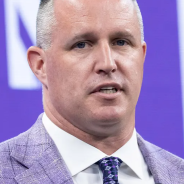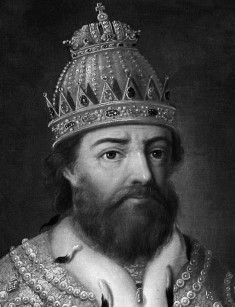
Boris Godunov: biography
He was the great tyrant and murderer who exposed the country to devastating starvation and involved it into the chaos of The Time of Troubles. During 7 years of Boris Gidunov’s reign, Russia strengthened its influence and national borderlines, but the domestic conflicts led to the Lzhedmity’s ascending the throne.
Boris was born in 1552 into the family of the landowner who lived not far from the town Vyazma. The origin of the family goes to the Tatar Chet Murza who had settled in Rus’ during the reign of Ivan I of Moscow. Boris’s ancestors were the Kostroma boyars who became the Vyazma landowners in the course of time.
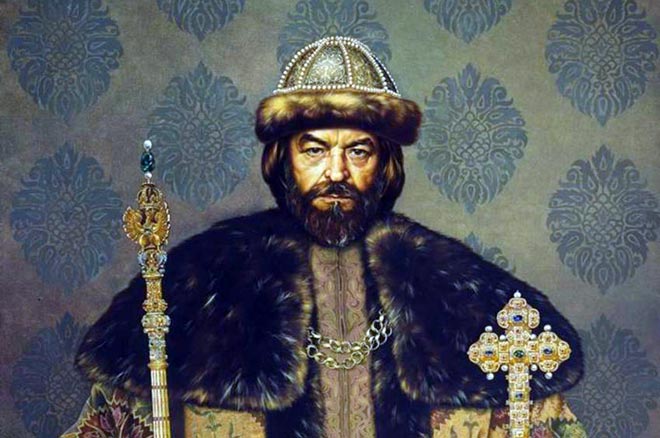
As a provincial nobleman, the young man received education but did not learn the Holy Writ. The knowledge of church books was considered to be the major component of education, and no gaps in this sphere were tolerated. The contemporaries called the future czar an uneducated and nasty youth – his literacy and calligraphy were not taken into account.
The czar confidant
In 1565, Ivan the Terrible was fighting for the unrestricted power; to achieve this, he separated Rus’ into two parts: zemshchina (“land”) and oprichnina. In the latter, there were a separate Duma, ministry, and army. The Godunovs’ land turned out to be there, in the oprichnina territory, and Dmity Ivanovich (Boris’s uncle) enrolled in the military corpus. At the cost of the disgraced boyars, he enlarged his lands. The czar appreciated Dmitry’s achievements, made him his confidant, and gave him a rank.
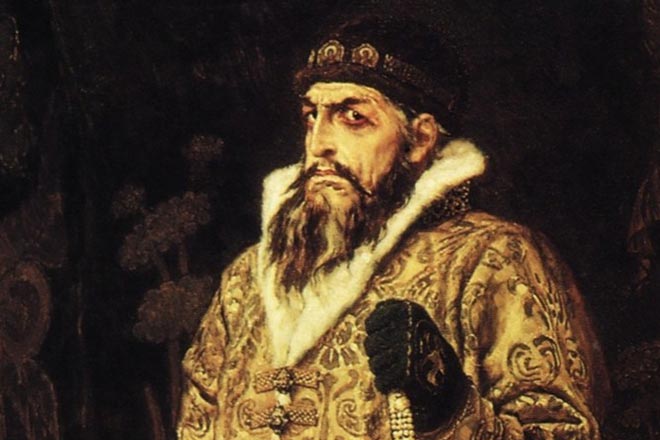
After Boris’s parents Irina and Boris Godunovy died, the uncle took custody of the children. The constant trips were not good for the proper upbringing, and Dmitry made a deal with the czar and placed the orphans to the Kremlin. The children grew up together with the czar’s successors. Ivan the Terrible liked to talk to the youngest Godunov and even ordered to write down his own wise thoughts.
The young man was attracted to power and court luxury, yet he was appalled by the tortures imposed by the Terrible on the disgraced. The young man realized that he would not survive under these bloody conditions unless he learned how to control his sympathy and emotions. He had to take torture devices and have fun with the Terrible and his people.
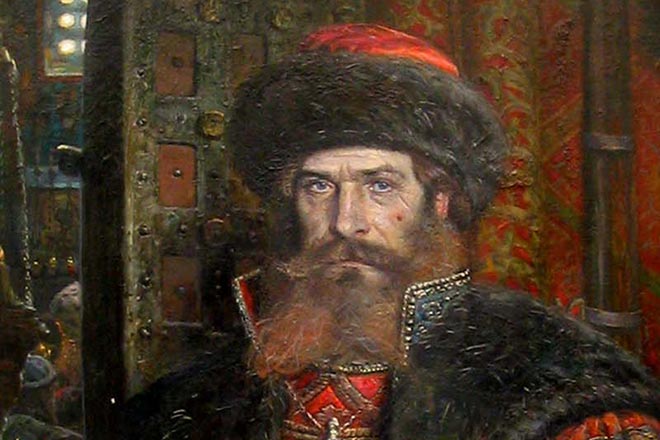
At 18, Boris became the state chamberlain – the former had been staked. Since that moment, the young man became the czar’s eyes and ears and managed the Kremlin household and security. Whispering and behind-the-scenes struggles were Boris’s own territory, and he had to fight his rivals.
Malyuta Skuratov liked the clever court member – he was feared for his life and looked for faithful followers. Malyuta married Godunov on his younger daughter Maria while Vasily Shuysky married the elder one.
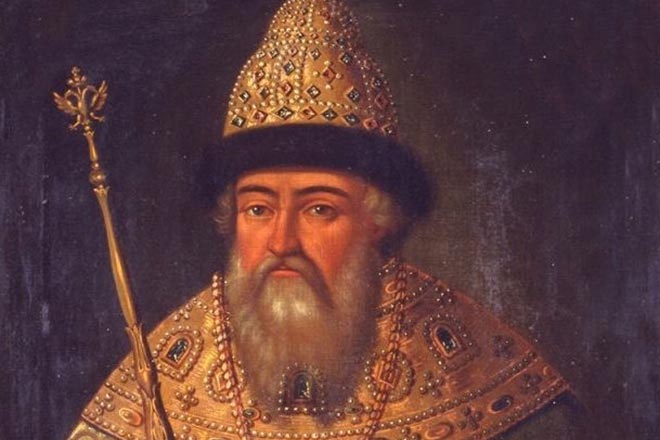
In 1571, the young court member proposed Ivan’s son his relative Eudoxia Sabourova as a wife. The czar disliked the potential daughter-in-law, accused her of disrespect, and sent her to the monastery. Boris learned that the lustful father-in-law sexually harassed the young beauty and got angry because she rejected him. Godunov shared his opinion with his friend who immediately reported the czar about it.
The chamberlain’s carrier was at risk: the angry Ivan IV could execute him any minute. The man was saved from the prison by his beloved sister Irina who managed to ask Fyodor, the czar’s son, to solve the mercy issue. The young woman was notable for her intelligence, literacy, and beauty. Since childhood, Fyodor liked the charming Irina who did not pay attention to his clumsy courtship.
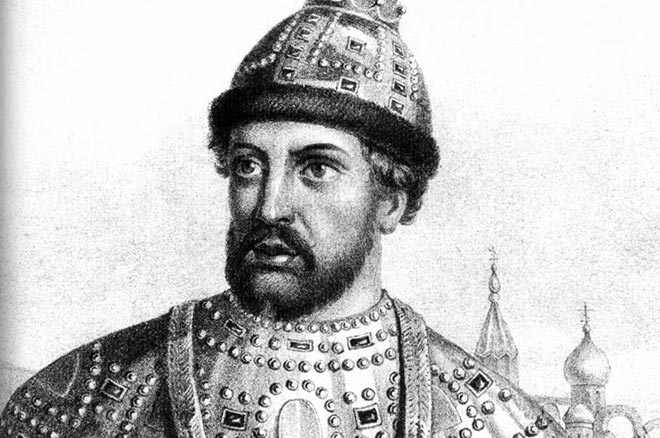
The beauty liked reading, learned, and was good at math. When her brother was in danger, she went to the czar’s son who persuaded his father to have mercy on Godunov. For this, the young woman had to marry the weak-brained Fyodor. Boris became a boyar.
During Fyodor's reign
In 1581, in the middle of the quarrel, the czar murdered his own son Ivan. Fyodor Ioannovich became the candidate successor. Three years later, the Terrible died dreadfully, chocking with his own blood. Rumor had it that the czar was killed by the innocent people’s blood. The only successor became the new czar.
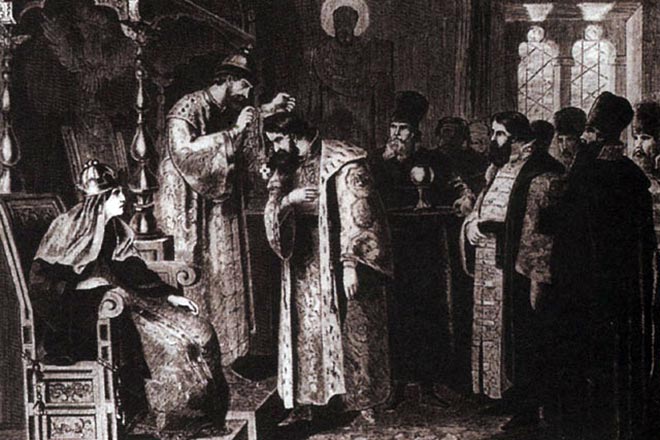
Fyodor got tired of holding the golden apple that represented the orb and gave it to Godunov. As the palace believed, this event was historical. In Kremlin, the regent board was created: Yuryev, Belsky, Mstislavsky, Shuysky, and Godunov were the members. The boyars realized this czar was unable to rule the country, and the harsh struggle for the throne began.
Godunov skillfully interpreted the civil unrests and accused Belsky of executions, tortures, and abuse over people. The former favorite was exiled. The difficult fight against the boyar families followed – they did not want to share the power with the “nameless social climber” and used force while Boris employed scheming and artifice.
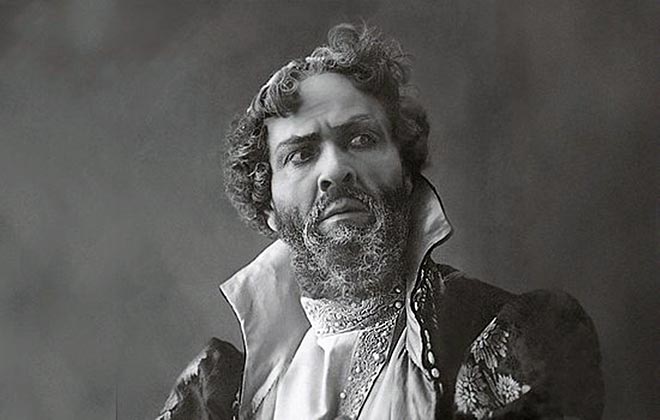
As he won the victory over his rivals, the future czar decided to get rid of the only possible claimant to throne. The Terrible had another offspring – the czarevitch Dmitry who had been sent to Uglich with his mother. The child died in 1591 when he pierced himself with a knife during an epileptic seizure. The special commission found no traces of crime in the death of the czarevitch. Godunov was not accused of the murder since there was no direct evidence of his involvement – only indirect proofs.
This moment of Godunov’s biography was masterfully described by Pushkin in his tragedy “Boris Godunov”:
“…all things revolt me,
And my head whirls, and in my eyes are children
Dripping with blood; and gladly would I flee,
But nowhere can find refuge—horrible!
Pitiful he whose conscience is unclean!”
In 1869, the composer Mussorgsky was so impressed by the poem that he created the opera under the same title in which he showed the interaction between the people and their ruler in detail.
Reforms
The exceptional plotter and skillful politician had been ruling the country for 13 years under the name of Fyodor Ioannovich. At this period, new cities, strong fortresses, and churches were being built. Talented constructors and architects could receive state financing. In Moscow, the first waterline called the Kremlin waterline was created. In 1596, according to Godunov’s act, Smolensk Kremlin was built to create the western borderlines of Russia from the Polish.
Boris entrusted Fyodor Savelev to build the external part of the wall that belted the White City. The foreign visitors who had been to Moscow wrote that it was impossible to take the city by storm. The Crimea khan Ğazı II Giray confirmed this opinion since he did not risk to besiege the fortress walls. For this achievement, the czar’s governor was entitled as “The Czar’s Servant” which was prestigious.
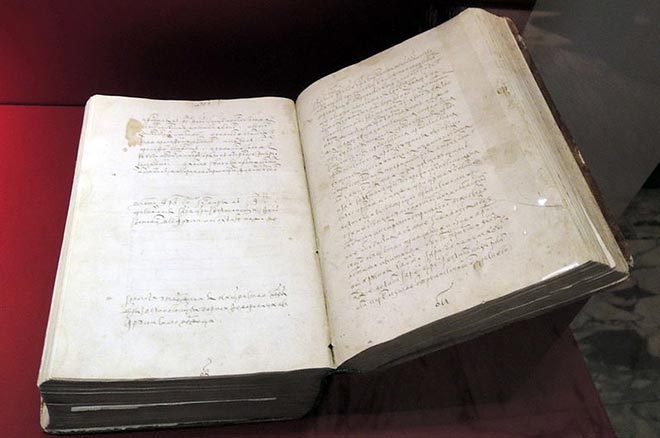
Thanks to Godunov, in 1595, the peace treaty was signed with the Swedes, and the Russo-Swedish war that had lasted for 3 years was over. Under the politician’s governance, Rus’ got Korela, Ivangorod, Yam, and Koporye. At this period, Patriarchate was established which gave the Orthodox Church the opportunity to leave the Byzantium Patriarchate.
Godunov set the time of escape peasant serfs search – now, they would be chased down for 5 years and then receive their freedom. He also exempted from taxation the lands of the owners who managed farming themselves, without employed workers.
Reign
In January 1598, the last member of the Rurik dynasty Fyodor died. His widow Irina became a temporary ruler. There were no direct successors, and Godunov could finally reign. Zemsky Sobor elected him as a ruler – the fact that the deceased czar was only a nominal figure and Boris managed the country contributed to this decision significantly.
As he became the czar, the man realized how hard it was to wear the Monomakh's Cap. While the first three years of his leadership are marked with flourishing of Rus,’ the next events bring the achievements to nothing. In 1599, Boris tried to get closer to the Western counties since he realized the Russian people developed slowly in education and medicine. In accordance with the czar’s act, the court members invited foreign masters and doctors, and Boris personally spoke to each of them.
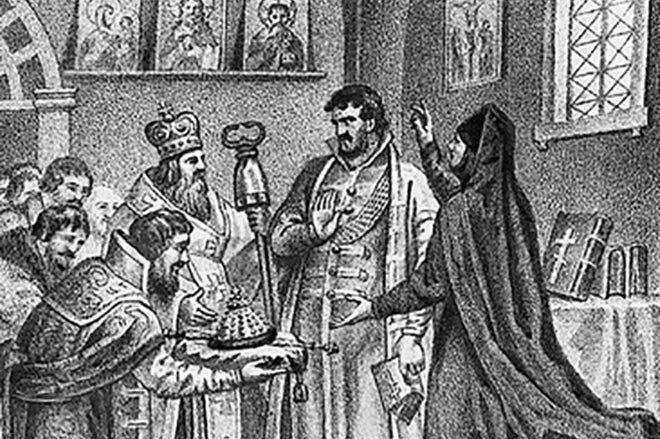
In a year, the ruler decided to establish a university in Moscow where foreign teachers would work. To put this project into practice, he sent talented young people to France, England, Austria so that they would gain the necessary teaching experience.
In 1601, the mass starvation happened: the crop failure and early freezing contributed to it. As per the czar’s act, the taxes were reduced to help the people. Boris took measures to save the starving and passed out the treasury money and crops. The prices went through the roof, but the czar did not punish the profiteers. Soon, the treasury and barns were empty.
Peasants had to consume saltbush, dogs, cats. The cases of cannibalism became more frequent. Moscow streets were full of dead bodies which soldiers were throwing to mass graves. Godunov asked people to keep calm, but they were disturbed by it: peasants considered it to the czar’s weakness.
127 thousand people died of starvation. Rumor had it that God was punishing Rus’ for the illegal line of succession. Peasants’ worries transformed into the riot led by Khlopok. The army defeated the rebels, but after that, the situation was not under control because the czarevitch Dmitry was said to be alive.
Lzhedmitry
Boris Godunov understood that Lzhedmitry’s position was much better than his own – people believed the pretender was Ivan the Terrible’s son. The czar’s agents collected the information and provided Boris with the facts that the unpleasant person – the unfrocked monk Grigory Otrepyev represented himself as the czarevitch. The Russian people believed that the real successor came to save them from starvation and cold.
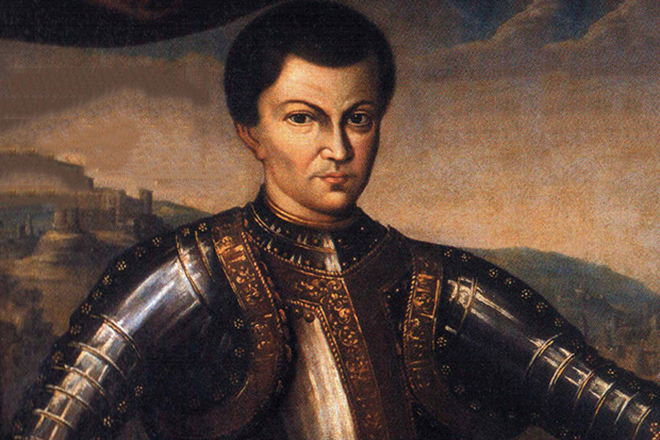
The Polish provided financing to equip Otrepyev’s army and support him in his war for the throne. The Russians also backed the self-proclaimed czarevitch – even army squads deserted to him. The crowd of wreckers and bandits did not win, and Lzhedmitry had to flee to Putyvl. This news cheered Godunov up: he took the betrayal of the palace and the army to heart.
Personal life
Maria Skuratova was the first elected czar’s wife. Few facts are known about the young woman, but they portray her positively: the well-bred, obedient beauty became a faithful companion to her husband. For 10 years of their life together, the woman failed to give birth to at least one child. Doctors could do nothing and said she was infertile.
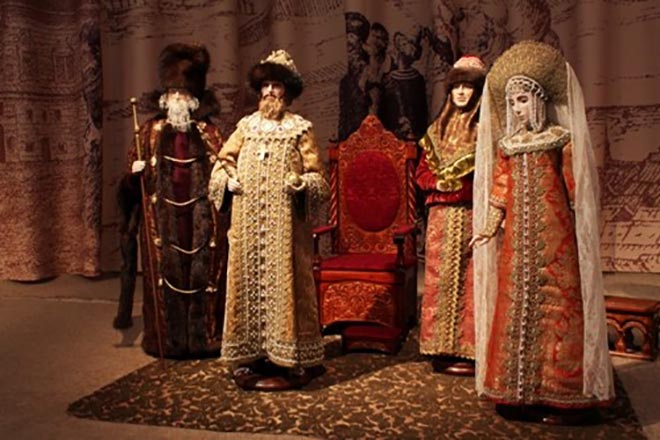
The desperate husband invited a famous English doctor who managed to improve the woman’s health. Two years later, two children were born – the son Fyodor and the daughter Ksenia. Godunov used to spend his free time with his family and said he had a proper rest only among his nearest and dearest. The ruler saw his children as the future of the dynasty, so both kids had the best education.
Since childhood, the boy was being prepared to rule, and European and Moscow educators taught him. Karamzin said that Fyodor was the first person brought up in the European way in Russia. The English ambassador Jerome Horsey wrote in his diaries that the relationships in the czar’s family were warm which was rare in Rus.’
Death
For a long time, Boris Godunov suffered from kidney stone disease and bad migraines. By the end of his life, he stopped believing his people and boyars and saw enemies everywhere except for his family. He kept his son close to himself and worried about the future.
On April 13, 1605, the czar was hosting the English diplomats when he an apoplectic seizure. Blood poured from his nose and ears, and the royal doctor was unable to help.
The boyars who were standing at the bed of the dying Boris asked about the loyalty oath to his son. The czar said: “As God and the people wish.” After that, he was unable to speak and died. His son Fyodor was announced the successor; he ruled for a month and a half only. As Lzhedmitry learned about the czar’s death, he went to Moscow with his army, accompanied by triumphant shouts of the crowd.
On the same day, as per Golitsyn’s order, soldiers chocked the Godunovs family to death. Only Ksenia was kept alive; she lost consciousness. The pardoned woman was made Lzhedmitry’s concubine. As he got fed up with her, he sent the dishonored beauty to the monastery.
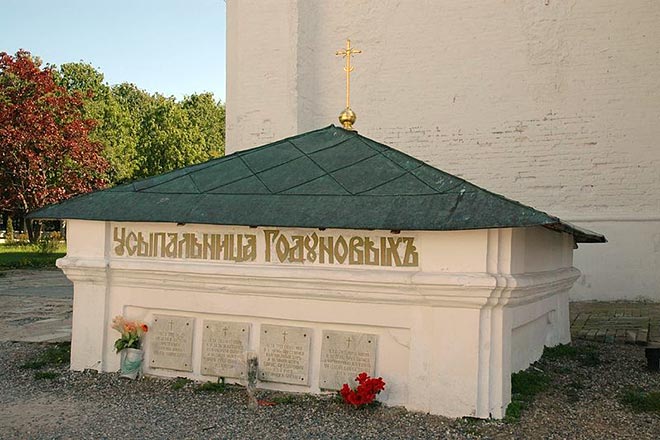
Godunov was buried in Cathedral of the Archangel but, during the mutiny, the coffin was taken out and placed to Svyato-Varsonofiyevskiy Zhenskiy Monastery. Two years later, Vasily Shuysky ordered the Gidunovs to be reburied in Trinity Lavra of St. Sergius.
In the unlucky ruler’s biography, there is a mystery unsolved by historians up till now: after Godunov’s death, his head went missing. It is unknown when the skull was separated from the body bones. The fact was proved by the anthropologist Gerasimov who opened the crypt in order to restore the dead man’s appearance.

